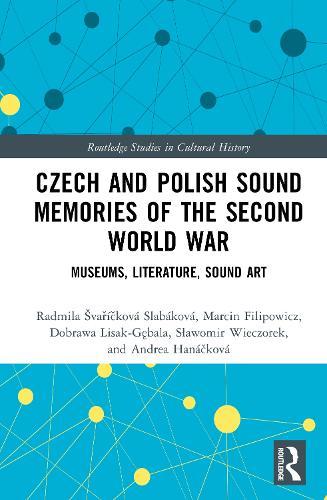Overview
This book investigates the crucial yet often overlooked role of sound in shaping the memory of the Second World War. Through an interdisciplinary and transnational approach, this volume addresses a notable gap in memory studies and argues that auditory experiences are central to how war is remembered, commemorated and narrated. By placing sound at the heart of collective remembrance, this book reveals how sonic elements influence public discourse, shape collective identities and contribute to the evolving transformation of war memory. Bringing together scholars from the Czech Republic and Poland, this volume examines how the Second World War has been remembered through sound since the 1990s across three distinct media: museum exhibitions, prose fiction and sound art – including soundwalks and field recordings. This innovative framework underscores the importance of exploring how different media evoke and reproduce sound to grasp the complexity and diversity of wartime memory in Central Europe. Focusing on Czech and Polish memory cultures, the book demonstrates that sound may function in multiple and sometimes contradictory ways: as a means of reinforcing national narratives, as a tool for critical engagement, or as a medium for experimental and marginal perspectives. This volume is essential reading for scholars in memory studies, sound studies, cultural and public history, museology, literary theory and musicology, as well as for museum professionals and anyone interested in how the past resonates – literally and metaphorically – through sound.
Full Product Details
Author: Radmila Švaříčková Slabáková ,
Marcin Filipowicz ,
Dobrawa Lisak-Gębala ,
Sławomir Wieczorek
Publisher: Taylor & Francis Ltd
Imprint: Routledge
Weight: 0.700kg
ISBN: 9781032907499
ISBN 10: 1032907495
Pages: 278
Publication Date: 02 November 2025
Audience:
Professional and scholarly
,
College/higher education
,
Professional & Vocational
,
Postgraduate, Research & Scholarly
Format: Hardback
Publisher's Status: Active
Availability: Not yet available

This item is yet to be released. You can pre-order this item and we will dispatch it to you upon its release.
Reviews
“Sound remains one of the least explored areas within the flourishing field of memory studies. As a Czech-Polish memory venture, this book addresses a significant gap by mapping the polyphonic mnemoscape of World War II across diverse memory media. A landmark in memory studies.” Jie-Hyun Lim, Sogang University “This pioneering collection of essays brings together the historical intersection between sound, memory and war in new and innovative ways. The interdisciplinary approach adopted opens exciting avenues of inquiry and in so doing is an indispensable and invaluable volume in the field of sound studies and war.” Joy Damousi, University of Melbourne “This imaginative study challenges the visual bias that has long dominated memory studies, drawing attention to sonic icons that resonate across generations. Through its comparative, transnational, and multisensory approach, it offers a vital contribution to memory studies, sound studies, and post-socialist heritage research. It transforms the way we listen to the past."" Ewa Domańska, Adam Mickiewicz University in Poznań; Visiting Professor, Stanford University
“Sound remains one of the least explored areas within the flourishing field of memory studies. As a Czech-Polish memory venture, this book addresses a significant gap by mapping the polyphonic mnemoscape of World War II across diverse memory media. A landmark in memory studies.” Jie-Hyun Lim, Sogang University “This pioneering collection of essays brings together the historical intersection between sound, memory and war in new and innovative ways. The interdisciplinary approach adopted opens exciting avenues of inquiry and in so doing is an indispensable and invaluable volume in the field of sound studies and war.” Joy Damousi, University of Melbourne “This imaginative study challenges the visual bias that has long dominated memory studies, drawing attention to sonic icons that resonate across generations. Through its comparative, transnational and multisensory approach, it offers a vital contribution to memory studies, sound studies and post-socialist heritage research. It transforms the way we listen to the past."" Ewa Domańska, Adam Mickiewicz University in Poznań; Visiting Professor, Stanford University
Author Information
Radmila Švaříčková Slabáková is Professor of History at Palacký University Olomouc. She is editor of Family Memory: Practices, Transmission and Uses in a Global Perspective (Routledge, 2021). Marcin Filipowicz is Professor of Gender and Literary Studies at Charles University in Prague and at the University of Warsaw. He is the author of numerous articles and several monographs, including Configuring Memory in Czech Family Sagas: The Art of Forgetting in Generic Tradition (2022). Dobrawa Lisak-Gębala is an assistant professor at the Institute of Polish Studies, University of Wrocław. She is the author of the monograph Poetycka tanatosonika. Dźwięki przemocy zbrojnej w wierszach z lat 1939–1945 (2025). Sławomir Wieczorek is an assistant professor at the Institute of Musicology, University of Wrocław. He is the author of On the Musical Front: Socialist Realist Discourse on Music in Poland, 1948–1955 (2020) and co-editor of Sounds of War and Peace: Soundscapes of European Cities in 1945 (2018) and Sensitive Sound Recordings (2022). Andrea Hanáčková is Associate Professor of Theatre and Radio Studies at Palacký University Olomouc. She recently published Autorský rozhlasový dokument (2022), which charts three decades of independent Czech documentary production since the fall of communism.



